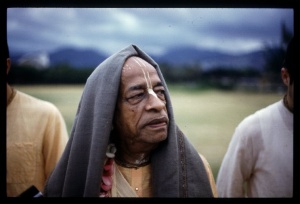SB 3.15.46

A.C. Bhaktivedanta Swami Prabhupada
TEXT 46
- kumārā ūcuḥ
- yo 'ntarhito hṛdi gato 'pi durātmanāṁ tvaṁ
- so 'dyaiva no nayana-mūlam ananta rāddhaḥ
- yarhy eva karṇa-vivareṇa guhāṁ gato naḥ
- pitrānuvarṇita-rahā bhavad-udbhavena
SYNONYMS
kumārāḥ ūcuḥ — the Kumāras said; yaḥ — He who; antarhitaḥ — not manifested; hṛdi — in the heart; gataḥ — is seated; api — even though; durātmanām — to the rascals; tvam — You; saḥ — He; adya — today; eva — certainly; naḥ — of us; nayana-mūlam — face to face; ananta — O unlimited one; rāddhaḥ — attained; yarhi — when; eva — certainly; karṇa-vivareṇa — through the ears; guhām — intelligence; gataḥ — have attained; naḥ — our; pitrā — by our father; anuvarṇita — described; rahāḥ — mysteries; bhavat-udbhavena — by Your appearance.
TRANSLATION
The Kumāras said: Our dear Lord, You are not manifested to rascals, even though You are seated within the heart of everyone. But as far as we are concerned, we see You face to face, although You are unlimited. The statements we have heard about You from our father, Brahmā, through the ears have now been actually realized by Your kind appearance.
PURPORT
The so-called yogīs who concentrate their mind or meditate upon the impersonal or void are described here. This verse of Śrīmad-Bhāgavatam describes persons who are expected to be very expert yogīs engaged in meditation but who do not find the Supreme Personality of Godhead seated within the heart. These persons are described here as durātmā, which means a person who has a very crooked heart, or a less intelligent person, just opposite to a mahātmā, which means one who has a broad heart. Those so-called yogīs who, although engaged in meditation, are not broad hearted cannot find the four-handed Nārāyaṇa form, even though He is seated within their heart. Although the first realization of the Supreme Absolute Truth is impersonal Brahman, one should not remain satisfied with experiencing the impersonal effulgence of the Supreme Lord. In the Īśopaniṣad also, the devotee prays that the glaring effulgence of Brahman may be removed from his eyes so that he can see the real, personal feature of the Lord and thus satisfy himself fully. Similarly, although the Lord is not visible in the beginning because of His glaring bodily effulgence, if a devotee sincerely wants to see Him, the Lord is revealed to him. It is said in Bhagavad-gītā that the Lord cannot be seen by our imperfect eyes, He cannot be heard by our imperfect ears, and He cannot be experienced by our imperfect senses; but if one engages in devotional service with faith and devotion, then God reveals Himself.
Here the four sages Sanat-kumāra, Sanātana, Sanandana and Sanaka are described as actually sincere devotees. Although they had heard from their father, Brahmā, about the personal feature of the Lord, only the impersonal feature—Brahman—was revealed to them. But because they were sincerely searching for the Lord, they finally saw His personal feature directly, which corresponded with the description given by their father. They thus became fully satisfied. Here they express their gratitude because although they were foolish impersonalists in the beginning, by the grace of the Lord they could now have the good fortune to see His personal feature. Another significant aspect of this verse is that the sages describe their experience of hearing from their father, Brahmā, who was born of the Lord directly. In other words, the disciplic succession from the Lord to Brahmā and from Brahmā to Nārada and from Nārada to Vyāsa, and so on, is accepted here. Because the Kumāras were sons of Brahmā, they had the opportunity to learn Vedic knowledge from the disciplic succession of Brahmā, and therefore, in spite of their impersonalist beginnings, they became, in the end, direct seers of the personal feature of the Lord.